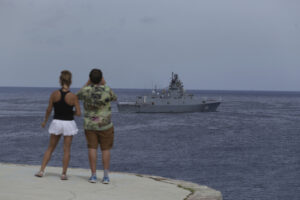NATO Expansion is Still an Option
After weeks of fighting in Ukraine, reports surfaced in the beginning of April that Finland and Sweden were making serious moves to join the North Atlantic Treaty Organization (NATO).

Image Credit: The Global Times
After weeks of fighting in Ukraine, reports surfaced in the beginning of April that Finland and Sweden were making serious moves to join the North Atlantic Treaty Organization (NATO). Public opinion in both countries to join the alliance has swayed in support after Russia invaded Ukraine on February 24th. NATO was created in 1949 in the aftermath of World War II as an international military alliance that also promotes democratic values and inter-governmental diplomacy. Any country that is part of NATO is protected under Article 5 of the treaty, which states that “an attack against one Ally is considered as an attack against all Allies.” The news that Finland and Sweden are interested in joining the alliance is particularly noteworthy for two reasons. First, it’s a clear example of Russia’s invasion backfiring on the country’s goal of NATO destabilization and confinement. Second, it reinvigorates the argument over whether NATO expansion was valid and necessary or reckless and inflammatory.
To weigh these two perspectives, this article examines whether Russia’s current invasion of Ukraine was due to Russian imperialism or prior NATO expansion. In other words, if NATO hadn’t expanded after the Cold War, would Russia still be acting in the aggressive, imperialistic manner it is today?
In an op-ed for The New York Times, Thomas L. Friedman takes a critical stance on NATO enlargement, with a supporting argument from George F. Kennan. The Russia expert, and former Ambassador to the Soviet Union, asserts “There was no reason for [NATO expansion] whatsoever. No one was threatening anybody else.” Yet this is far from true. In the very same piece, Friedman ponders, “It was no mystery why these nations would want to be part of an alliance that obligated the U.S. to come to their defense in an attack by Russia, the rump successor to the Soviet Union.” Indeed, in an op-ed for The Atlantic, former President Bill Clinton defended his leadership over NATO expansion by recalling the post-Cold War era: “Neither the EU nor NATO could stay within the borders Stalin had imposed in 1945. Many countries that had been behind the Iron Curtain were seeking greater freedom, prosperity, and security with the EU and NATO.”
In reality, Ukraine wanted to join NATO of its own volition because of the very real threat of Russian imperialism on its border.
Russia’s failed leadership over its stagnating economy pushed many of its neighbors away. As a result, those countries sought better opportunities westward, which was a slap in the face for the authoritarian nationalist ruler. Putin justifies his invasion of Ukraine based on the West and NATO threatening Russia’s security. However, in reality, Ukraine wanted to join the alliance of its own volition because of the very real threat of Russian imperialism on its border. That threat would exist whether or not Ukraine was part of NATO. Some even argue that if Hungary, Poland, or other ex-Warsaw Pact states were not currently part of the alliance, they would be facing the same fate now or in due time.
In fact, after the Cold War, the NATO expansion wasn’t immediately the biggest worry on Putin’s mind. His interest only recently increased when he needed a reason to invade Ukraine and sow Western animosity. Friedman recalls that during his first two terms as president, Putin “occasionally grumbled about NATO expansion but did little more.” But as Russia’s economy stagnated over the last decade, Putin reinvented himself as a “nationalist avenger” and utilized “the most emotive threat to rally the Russian people behind him: ‘The low-hanging fruit of NATO expansion.’” In the present day, where Putin’s current defense for invading Ukraine has been backed by false histories and intense propaganda campaigns, it wouldn’t be hard for him to utilize the same tactics as his rationale even if NATO never expanded to Russia’s border. But in such a case, no strong alliance or international framework would be in place to check Russia’s aggression.
Even though NATO expansion in the past may have been the right path, now that Ukraine is under siege, the situation has grown more complicated.
The present fears of Russian aggression due to NATO expansion are genuine. Still, they should not be the basis of US foreign policy because they pander to the ego of an unpredictable and antagonistic authoritarian ruler, and the alternative is likely to be worse. Yet, even though NATO expansion in the past may have been the right path, now that Ukraine is under siege, the situation has grown more complicated. NATO works best when it is used as a deterrent. But with Ukraine already being attacked, it would now be a direct call for military intervention, something that almost all current NATO countries are opposed to. In conjunction, many NATO countries are opposed to further expansion because that would also increase the risk of activating Article 5. But even countries like Finland and Sweden, who have historically tried to stay neutral in international conflicts, are becoming more enticed by the notion of a global alliance against potential invasions. As for Ukraine, the path to joining NATO may now be embroiled in controversy, but that doesn’t mean it wasn’t justified then, and it shouldn’t be discounted as a viable policy now.
Roya Lotfi (she/her) formerly held the role of Editor-in-Chief at JPI Online Magazine. Her academic journey led her to a Master’s degree in International Relations from New York University, complementing her earlier BS in Biology from Montclair State University. Despite her scientific background, Roya’s unwavering passion for domestic and international politics guided her toward the vibrant world of IR. Prior to commencing her studies at NYU, she honed her skills in video production while working at Bright Trip Inc. and even contributed her talents to NBCUniversal. Looking ahead, her ultimate career aspiration is to create captivating video content focusing on current events and international relations within a media journalism organization. During her leisure hours, Roya enjoys indulging in reading and leisurely strolls around Central Park.




